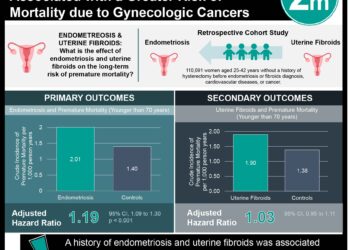Low revision rates after vaginal mesh
1. Overall reoperation rates ten years after vaginal mesh surgery for stress incontinence was low.
2. Patients of high-volume surgeons were less likely to require reoperation.
Evidence Rating Level: 2 (Good)
Study Rundown: Stress urinary incontinence impacts thousands of women in the U.S. and remains underreported. A combination of factors, including childbirth and obesity weaken pelvic musculature and contribute to urethral sphincter insufficiency, causing women to unintentionally lose urine when pressure intraabdominal pressure is increased during activities like coughing, sneezing, running or heavy lifting. While nonsurgical interventions such as pessaries can help manage symptoms, the standard of care is surgical treatment. Surgery involves placement of tension-free vaginal tape (a synthetic mesh sling) that gives extra support to the urethra. However, in recent years, concerns have been raised about the safety of vaginal mesh in light of large class action lawsuits for complications. Complications following the use of vaginal mesh placed for other indications, such as anterior wall prolapse, can include chronic pain, urethral fistulas, urinary retention and mesh erosion into the urethra or vagina and can require surgical revisions. These complications have caused many to question whether tension-free vaginal tape might also increase risk for these complications. In this 10-year, population-based cohort study, researchers measured the incidence of mesh removal or revision following stress urinary incontinence procedures to determine whether there are surgeon or patient risk factors.
Overall, only one in 30 women experienced complications requiring repeat surgery. Patients of low-volume surgeons (≤75th percentile) were 37 percent more likely to require a revision or removal. Strengths included the large, population-based sample and limiting analysis to women who received mesh for urinary incontinence—previous studies have suggested that mesh-based complications may be higher when used in procedures for pelvic organ prolapse. The use of a Canadian cohort may limit generalizability to the U.S. population given differences in health systems and surgical practices. Additionally, primary outcome of repeat surgery may fail to detect less severe complications that don’t require surgical revision. Long-term follow-up study in the U.S. population is merited.
Click to read the study in JAMA Surgery
Click to read associated commentary in JAMA Surgery
Relevant Reading: Prevalence of Symptomatic Pelvic Floor Disorders in US Women
In-Depth [retrospective cohort study]: All women who underwent surgery for stress urinary incontinence with synthetic vaginal mesh in Ontario, Canada from 2002-2010 (n = 59 887) were included. The primary outcome was need for a second surgery for mesh revision or removal due to erosion, fistula, pain or urinary retention. Results were stratified by surgical annual volume of mesh-based procedures and surgical specialty.
Among 59 887 women, repeat surgery was required in 1307 women, leading to a 10-year cumulative incidence rate of 3.29%. Patients of high-volume surgeons (≥75th percentile) were less likely to require surgery (HR = 0.73, 95%CI 0.65-0.83). Patient of urogynecologists were not more likely to have complications compared with patients of urologists.
Image: CC/Flicker/haru_q
©2015 2 Minute Medicine, Inc. All rights reserved. No works may be reproduced without expressed written consent from 2 Minute Medicine, Inc. Inquire about licensing here. No article should be construed as medical advice and is not intended as such by the authors or by 2 Minute Medicine, Inc.







![Nanoparticles targeting immune cell surface proteins may protect from sepsis [PreClinical]](https://www.2minutemedicine.com/wp-content/uploads/2015/09/18169_lores-75x75.jpg)